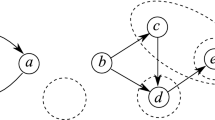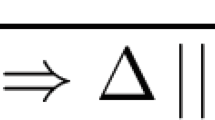Abstract
In the context of intuitionistic implicational logic, we achieve a perfect correspondence (technically an isomorphism) between sequent calculus and natural deduction, based on perfect correspondences between left-introduction and elimination, cut and substitution, and cut-elimination and normalisation. This requires an enlarged system of natural deduction that refines von Plato’s calculus. It is a calculus with modus ponens and primitive substitution; it is also a “coercion calculus”, in the sense of Cervesato and Pfenning. Both sequent calculus and natural deduction are presented as typing systems for appropriate extensions of the λ-calculus. The whole difference between the two calculi is reduced to the associativity of applicative terms (sequent calculus = right associative, natural deduction = left associative), and in fact the achieved isomorphism may be described as the mere inversion of that associativity.
The novel natural deduction system is a “multiary” calculus, because “applicative terms” may exhibit a list of several arguments. But the combination of “multiarity” and left-associativity seems simply wrong, leading necessarily to non-local reduction rules (reason: normalisation, like cut-elimination, acts at the head of applicative terms, but natural deduction focuses at the tail of such terms). A solution is to extend natural deduction even further to a calculus that unifies sequent calculus and natural deduction, based on the unification of cut and substitution. In the unified calculus, a sequent term behaves like in the sequent calculus, whereas the reduction steps of a natural deduction term are interleaved with explicit steps for bringing heads to focus. A variant of the calculus has the symmetric role of improving sequent calculus in dealing with tail-active permutative conversions.
Similar content being viewed by others
References
Cervesato, I., Pfenning, F.: A linear spine calculus. J. Log. Comput. 13(5), 639–688 (2003)
Curien, P.-L., Herbelin, H.: The duality of computation. ACM SIGPLAN Not. 35(9), 233–243 (2000). Proceedings of the Fifth ACM SIGPLAN International Conference on Functional Programming (ICFP ’00), Montreal, Canada, September 18–21 (2000)
Curry, H.B., Feys, R.: Combinatory Logic. Noth-Holland, Amsterdam (1958)
Dyckhoff, R., Pinto, L.: Cut-elimination and a permutation-free sequent calculus for intuitionistic logic. Studia Log. 60, 107–118 (1998)
Dyckhoff, R., Pinto, L.: Permutability of proofs in intuitionistic sequent calculi. Theor. Comput. Sci. 212, 141–155 (1999)
Espírito Santo, J.: Revisiting the correspondence between cut-elimination and normalisation. In: Proceedings of ICALP’2000. Lecture Notes in Computer Science, vol. 1853, pp. 600–611. Springer, Berlin (2000)
Espírito Santo, J.: Conservative extensions of the λ-calculus for the computational interpretation of sequent calculus. PhD thesis, University of Edinburgh (2002). Available at http://www.lfcs.informatics.ed.ac.uk/reports/
Espírito Santo, J.: An isomorphism between a fragment of sequent calculus and an extension of natural deduction. In: Baaz, M., Voronkov, A. (eds.) Proceedings of LPAR’02. Lecture Notes in Artificial Intelligence, vol. 2514, pp. 354–366. Springer, Berlin (2002)
Espírito Santo, J.: Completing Herbelin’s programme. In: Ronchi Della Rocca, S. (ed.) Proceedings of TLCA’07. Lecture Notes in Computer Science, vol. 4583, pp. 118–132. Springer, Berlin (2007)
Espírito Santo, J.: Delayed substitutions. In: Baader, F. (ed.) Proceedings of RTA’07. Lecture Notes in Computer Science, pp. 169–183. Springer, Berlin (2007). (See also the manuscript, Addenda to ‘Delayed Substitutions’, available from the author’s web page)
Espírito Santo, J.: Refocusing generalised normalisation. In: Cooper, S.B., Lowe, B., Sorbi, A. (eds.) Proceedings of CiE’07. Lecture Notes in Computer Science, vol. 4497, pp. 258–267. Springer, Berlin (2007)
Espírito Santo, J., Frade, M.J., Pinto, L.: Structural proof theory as rewriting. In: Pfenning, F. (ed.) Proc. of RTA’06. Lecture Notes in Computer Science, vol. 4098, pp. 197–211. Springer, Berlin (2006)
Espírito Santo, J., Pinto, L.: Permutative conversions in intuitionistic multiary sequent calculus with cuts. In: Hoffman, M. (ed.) Proc. of TLCA’03. Lecture Notes in Computer Science, vol. 2701, pp. 286–300. Springer, Berlin (2003)
Gallier, J.: Logic for Computer Science: Foundations of Automated Theorem Proving. Wiley, New York (1986)
Gentzen, G.: Investigations into logical deduction. In: Szabo, M.E. (ed.) The Collected Papers of Gerhard Gentzen, pp. 68–131. North-Holland, Amsterdam (1969)
Herbelin, H.: A λ-calculus structure isomorphic to a Gentzen-style sequent calculus structure. In: Pacholski, L., Tiuryn, J. (eds.) Proceedings of CSL’94. Lecture Notes in Computer Science, vol. 933, pp. 61–75. Springer, Berlin (1995)
Howard, W.A.: The formulae-as-types notion of construction. In: Seldin, J.P., Hindley, J.R. (eds.) To H.B. Curry: Essays on Combinatory Logic, Lambda Calculus and Formalism, pp. 480–490. Academic Press, New York (1980)
Joachimski, F., Matthes, R.: Short proofs of normalization for the simply-typed lambda-calculus, permutative conversions and Gödel’s T. Arch. Math. Log. 42, 59–87 (2003)
Kleene, S.: Introduction to Metamathematics. North-Holland, Amsterdam (1952)
Miller, D., Nadathur, G., Pfenning, F., Scedrov, A.: Uniform proofs as a foundation for logic programming. Ann. Pure Appl. Log. 51, 125–157 (1991)
Mints, G.: Normal forms for sequent derivations. In: Odifreddi, P. (ed.) Kreiseliana, pp. 469–492. A.K. Peters, Wellesley (1996)
Negri, S., von Plato, J.: Structural Proof Theory. CUP, Cambridge (2001)
Parigot, M.: λ μ-calculus: an algorithmic interpretation of classic natural deduction. In: Int. Conf. Logic Prog. Automated Reasoning. Lecture Notes in Computer Science, vol. 624, pp. 190–201. Springer, Berlin (1992)
Pottinger, G.: Normalization as a homomorphic image of cut-elimination. Ann. Math. Log. 12, 323–357 (1977)
Prawitz, D.: Natural Deduction. A Proof-Theoretical Study. Almquist and Wiksell, Stockholm (1965)
Schwichtenberg, H.: Termination of permutative conversions in intuitionistic Gentzen calculi. Theor. Comput. Sci. 212, 247–260 (1999)
von Plato, J.: Natural deduction with general elimination rules. Ann. Math. Log. 40(7), 541–567 (2001)
Zucker, J.: The correspondence between cut-elimination and normalization. Ann. Math. Log. 7, 1–112 (1974)
Author information
Authors and Affiliations
Corresponding author
Rights and permissions
About this article
Cite this article
Espírito Santo, J. The λ-Calculus and the Unity of Structural Proof Theory. Theory Comput Syst 45, 963–994 (2009). https://doi.org/10.1007/s00224-009-9183-9
Received:
Accepted:
Published:
Issue Date:
DOI: https://doi.org/10.1007/s00224-009-9183-9




